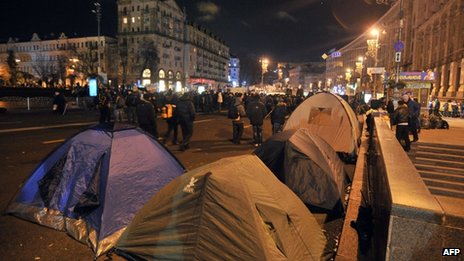
The BBC's Steve Rosenberg reports from the barricades on Independence Square
Demonstrators are blockading government buildings in the Ukrainian capital Kiev, as they step up their campaign for the resignation of the government.
Protesters have put up barricades on Independence Square, while others are entrenched inside city hall.
The unrest was triggered in November by President Viktor Yanukovych’s refusal to sign a deal on closer EU ties.
Opposition leaders have renewed demands that he stand down, and urged him to “stop political repression”.
The call was issued on Monday at a meeting in Parliament convened by Speaker Volodymyr Rybak, the Ukrainska Pravda news website reported.
The opposition leaders refused to speak to Mr Rybak directly, the site added.
They also demanded the release of the jailed former Prime Minister Yulia Tymoshenko – who has been convicted of abuse of power.
On Sunday Mr Rybak had said President Yanukovych was “on the side of the people who are fully entitled to assemble for peaceful demonstrations and to express their views”.
Overnight hundreds of people put up tents on Independence Square, amid calls for a general strike.
The headquarters of the cabinet has been blockaded, with government employees unable to reach work.
Police reinforcements are being sent to Kiev, Ukrainska Pravda reported.
As thousands of protesters converged on Independence Square on Monday they chanted slogans including “Out with the gang!”

Protesters have erected barricades in central Kiev

The main government building has been blocked off

Activists have put tents up on Independence Square

Some stormed Kiev city hall on Sunday
On Sunday, several hundred thousand people took part in a march, defying a ban on rallies.
There were clashes near the presidential building, with demonstrators firing flares and riot police using tear gas, batons and stun grenades. TV footage appeared to show officers beating reporters.
The main opposition leaders condemned the violence, saying it was the work of “provocateurs”. There were also clashes on Sunday as Kiev protesters tried to topple a statue of Lenin.
Some protesters stormed the city hall. One of them is the Russian opposition activist Pyotr Verzilov – husband of Pussy Riot punk group member Nadezhda Tolokonnikova, who is in jail in Russia.
He told the BBC that the protesters were preparing to fight any attempt by police to evict them.
Also on Sunday, activists invaded Trade Unions House, another government building in central Kiev, and set up their main headquarters there.
The leader of the opposition Fatherland party, Arseny Yatsenyuk, said a no-confidence motion had been submitted to parliament.
Another opposition leader, current WBC boxing champion Vitali Klitschko, urged supporters not to give up control of central Kiev.
“We must mobilise everyone across the country and not lose the initiative,” he said.
Protests started more than a week ago after President Yanukovych suspended preparations for signing an EU association agreement that would have opened borders to goods and set the stage for an easing of travel restrictions.
The deal was to be the centrepiece of a EU meeting in the Lithuanian capital, Vilnius last week.
President Yanukovych defended his refusal to sign by saying the EU was not offering adequate financial aid to upgrade Ukraine’s economy.
He also argued that Ukraine could not afford to sacrifice trade with Russia, which opposed the agreement.

Moscow and Ukraine
- 1991: Independence from the Soviet Union declared
- 1997: Friendship treaty with Russia and agreement on Black Sea fleet.
- Nov 2004: Moscow-backed candidate Viktor Yanukovych declared president after poll, despite reports of massive fraud. Opposition launches mass protests, dubbed the Orange Revolution
- Dec 2004: Opposition candidate Viktor Yushchenko wins re-run
- 2009: Russia briefly stops gas supplies to Ukraine in row over pricing
- 2010: Yanukovych wins presidential election
- July 2013: Russia restricts imports from Ukraine, as Kiev seeks closer EU ties
- Nov 2013: President Yanukovych reverses decision to sign EU deal, triggering mass protests



Leave a reply